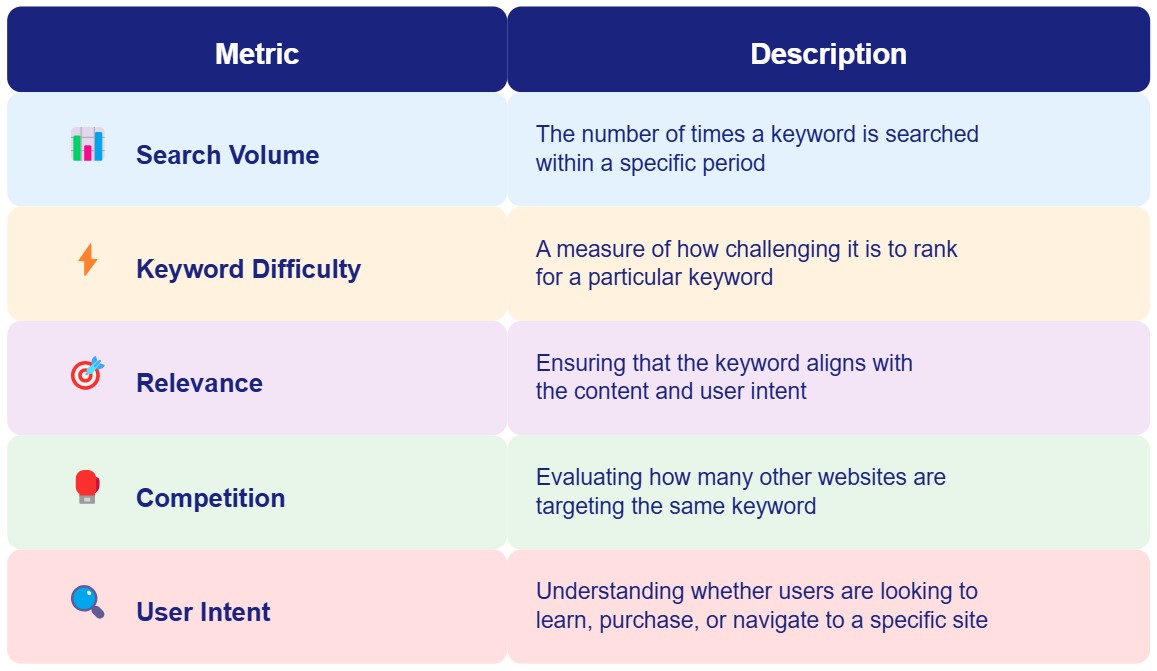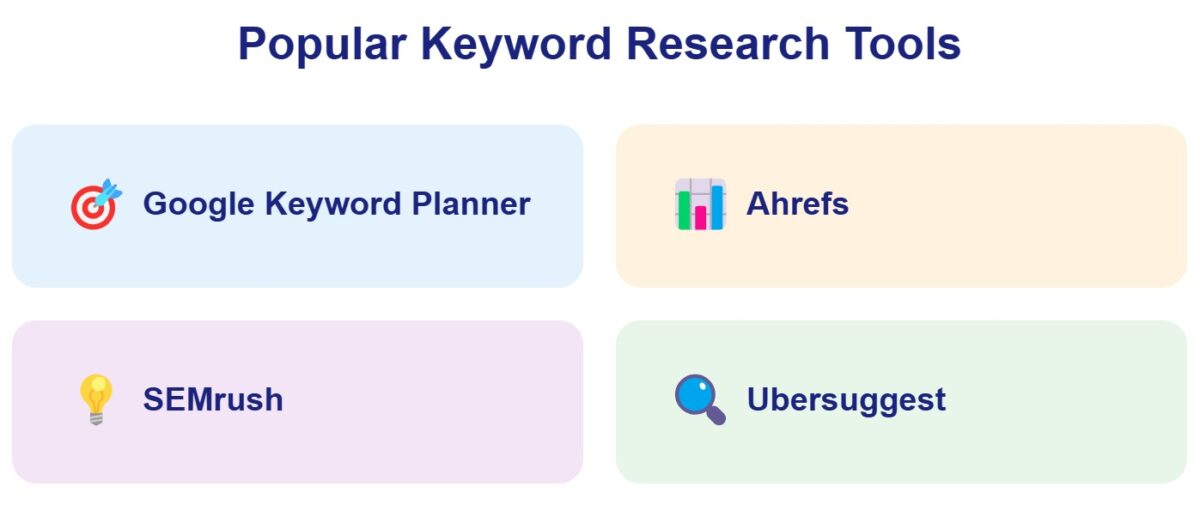The Ultimate SEO Keyword Research Guide
Keyword research remains the cornerstone of successful SEO strategy, with studies showing that 68% of online experiences begin with a search engine. Whether you’re managing a personal blog or overseeing a large-scale e-commerce platform, understanding and applying the elements of keyword research is crucial for online success.
This comprehensive guide by Indexed Zone SEO explores the importance of keyword research in SEO, demonstrates how to do keyword research effectively, and provides data-driven insights to help you maximize your search engine positioning.
What Is Keyword Research?
At its core, keyword research is the systematic process of discovering and analyzing the search terms that people actually use in search engines.
According to SEMrush’s 2023 State of Content Marketing Report, businesses that conduct thorough keyword research are 3.5x more likely to report success in their content marketing efforts.
Understanding how to research SEO keywords is essential for creating content that not only matches user intent but also improves relevance for search engine algorithms.
Why Is Keyword Research Important in SEO?
The importance of keyword research in SEO extends far beyond simple rankings. Here’s why it matters:
- Understanding User Intent: Keywords reveal what users are looking for, helping you tailor your content to meet their needs.
- Content Strategy: By targeting the right keywords, you can develop content that ranks well and attracts high-quality traffic.
- Competitor Analysis: KW research and analysis allow you to identify gaps in your competitors’ strategies and capitalize on them.
- Search Engine Optimization: Effective keyword research improves your website’s visibility, ultimately driving more organic traffic.

Elements of Keyword Research
Understanding the core elements of keyword research requires attention to several key metrics and factors, backed by industry data:
- Search Volume: The number of times a keyword is searched within a specific period.
- Keyword Difficulty: A measure of how challenging it is to rank for a particular keyword.
- Relevance: Ensuring that the keyword aligns with the content and user intent.
- Competition: Evaluating how many other websites are targeting the same keyword.
- User Intent: Understanding whether users are looking to learn, purchase, or navigate to a specific site.

How to Do Keyword Research
To effectively conduct keyword research, follow these data-backed steps:
1. Identify Seed Keywords
Begin with broad topics related to your business. Consider using internal data sources like customer inquiries and sales team insights, as these can reveal up to 40% more relevant keyword opportunities than tools alone.
Focusing on user intent also plays a crucial role in improving relevance for search engine algorithms, ensuring your content aligns with what users are searching for.
2. Use Keyword Research Tools
Keyword research tools are an irreplaceable part of any keyword research. There are many good ones out there, and we have extracted 4 of them that should serve as a great starting point.
- Google Keyword Planner
- Ahrefs
- SEMrush
- Ubersuggest

3. Analyze Competitor Keywords
Taking a look at what your competitors are doing can’t hurt, especially if they are doing SEO the right way. So, here’s how to approach competitors’ analysis:
- Map your top 10 competitors in search results
- Use competitive analysis tools to identify keyword gaps
- Focus on keywords where competitors rank in positions 4-10, as these present the best opportunities for displacement
- Evaluate Keyword Metrics
4. Evaluate Keyword Metrics
Successful SEO campaigns typically focus on a balanced mix of metrics. Here’s what to consider:
- Search Volume: While important, volume isn’t everything. In fact, keywords with 100-1,000 monthly searches often have the highest conversion rates.
- Keyword Difficulty: Pages targeting keywords with difficulty scores under 40 are much more likely to rank within six months.
- Relevance: Content relevance accounts for most of Google’s ranking factors, making it crucial for doing keyword research effectively.
5. Group Keywords by Intent
If your content is aligned with user intent, it will perform better in search rankings.
Simple as that.
That’s why you should organize and refine your strategy to target the user intent in your niche. Here’s how to do it the right way:
Informational Keywords (80% of searches)
- Focus on comprehensive guides and educational content
- Target featured snippets, which appear in 19% of searches
Navigational Keywords (10% of searches)
- Optimize for brand-related queries
- Focus on clear site architecture
Transactional Keywords (10% of searches)
- Target purchase-ready users
- Optimize for mobile, as 79% of purchase-related searches happen on mobile devices

6. Refine Your List and Prioritize
The importance of keyword research in SEO becomes evident during refinement, and here are the best practices to follow for this process.
- Remove keywords with less than 2% click-through rate potential
- Prioritize terms with clear commercial intent, which convert 2.8x better
- Update keywords quarterly, as 15% of Google searches are new each month
Keyword Research Guide for Different Types of SEO
Not every strategy is a one-size-fits-all. The strategy and keyword research approach should be modified based on the type of SEO you’re doing.
We understand that this might seem a bit confusing, but ultimately, there is a ready blueprint for you to follow, so let’s take a deep dive.
Local SEO
Local SEO focuses on optimizing your website to attract traffic from local searches. Keyword research for local SEO requires:
- Location-Specific Keywords: Include city or region names in your target keywords.
- Google My Business Integration: Ensure your GMB listing includes location-based keywords.
- User-Generated Content: Encourage reviews that naturally contain local keywords.
E-commerce SEO
For e-commerce sites, targeting high-intent keywords is essential:
- Product Keywords: Focus on specific product names and categories.
- Transactional Keywords: Use terms like “buy,” “discount,” and “shop now.”
- Competitor Analysis: Identify product gaps and keyword opportunities based on competitor listings.
Technical SEO
Keyword research in technical SEO involves optimizing metadata and improving site architecture:
- Meta Tags and Descriptions: Ensure target keywords are present.
- URL Structures: Keep URLs short and include primary keywords.
- Schema Markup: Use structured data to improve relevance for search engines.
Enterprise SEO
Enterprise SEO involves scaling keyword strategies for large websites:
- Broad and Niche Keyword Mix: Balance branded and non-branded terms.
- Content Automation: Use AI-driven tools to generate keyword-driven content.
- Cross-Department Collaboration: Work with marketing and product teams to maintain keyword consistency.
FAQs
How to do keyword research for a website?
Identify relevant seed keywords and use tools like Google Keyword Planner or SEMrush to analyze search volume and competition. Organize keywords by intent and strategically incorporate them into your website content and metadata.
What tools are best for keyword research?
There are several excellent tools for keyword research, including Google Keyword Planner, Ahrefs, SEMrush, and Ubersuggest. These tools offer valuable data on search volume, competition, and related keywords.
How often should I conduct keyword research?
It’s recommended to conduct keyword research at least quarterly. This ensures your content remains relevant and aligned with changing search trends.
Can I rank with only long-tail keywords?
Yes, long-tail keywords are often less competitive and can drive highly targeted traffic. However, a balanced approach that includes a mix of long-tail and broad keywords typically yields the best results.
How can I track keyword performance?
Use analytics tools like Google Analytics and Google Search Console to monitor keyword rankings, traffic, and user engagement.
What are common mistakes to avoid in keyword research?
Some common mistakes include targeting keywords with no search volume, ignoring user intent, and failing to update your keyword strategy regularly.
Build Your Keyword Strategy for Success
Keyword research is a fundamental aspect of SEO that requires continuous attention and adaptation.
By following this keyword research guide, you can develop a strategic approach that boosts your website’s visibility, improves relevance for search engine algorithms, and helps you maximize your search engine positioning.
Stay proactive, refine your approach regularly, and watch your online presence thrive.
Finally, if you want to take the guesswork out of keyword research and partner with experts who can help you achieve measurable SEO success, Indexed Zone SEO is here for you. Let us handle the complexities while you focus on growing your business.


